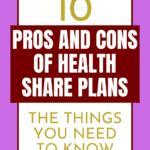THIS POST MAY CONTAIN AFFILIATE LINKS. PLEASE SEE MY DISCLOSURES. FOR MORE INFORMATION.
Health share plans, often called health share ministries, are alternatives to traditional health insurance.
They became popular after the Affordable Care Act, as the cost for health insurance rose to prices that many people could not afford.
Instead of going without insurance coverage, people joined together to help pay for one another’s medical bills.
Because so many people are looking into this alternative to insurance, I put together the biggest pros and cons of health share plans.
These are the things you need to know before you give up on traditional insurance.
As great an option health share ministries are, they are not perfect and not for everyone.
Table of Contents
10 Pros And Cons To Health Share Plans
5 Pros Of Health Share Plans
There are many advantages to health share plans.
Here are the biggest ones that make them stand out compared to traditional insurance.
#1. Cheaper Than Traditional Insurance
Health share plans are an affordable option compared to traditional insurance.
With traditional insurance, a family could easily pay $1,000 or more in monthly premiums.
With a health ministry, the monthly insurance premiums, called monthly shares, would be $300 – $500 on average.
That’s an average savings of $500 – $700 a month or up to $8,400 a year.
Granted your savings will depend on the type of plan you select among other variables.
This by far is the biggest benefit of health care sharing ministries.
#2. Choose Your Healthcare Providers
With a health share plan, there is no such thing as in-network or out-of-network coverage.
You don’t even need referrals to see specialists.
You see the medical provider you want to see.
This helps to make getting health care a lot less stressful.
There is nothing worse than finding out the doctor you want to see is not covered by your health insurance plan and you need to make a decision.
Do you see another doctor who might not be as good or you won’t like as much?
Or do you see the doctor you want, knowing you are going to have to pay higher out of pocket costs?
With health share plans, this decision is never one to make.
You can focus on getting the best healthcare for you and not make your decision based on healthcare cost.
#3. No Open Enrollment
Another benefit to health share ministries is there is no open enrollment period.
You can apply and get coverage whenever you need it.
Additionally, if you pick a plan and find it isn’t the right one for your needs, you can switch any time.
You don’t have to wait months for open enrollment to make changes.
#4. No Annual Limits
Most insurance plans limit health insurance costs on an annual or lifetime basis.
Once you hit this limit, you are on your own for paying any additional healthcare expenses.
With health sharing programs, there are no limits.
As long as the medical care you are receiving are eligible medical expenses, the program will pay for it.
#5. Know Where Your Money Goes
One of the coolest things about health share plans is some allow you to see where your money is going.
When you make your monthly payments, you sometimes will send it directly to the person or family in need.
You will also see why they need the money, for example, to help pay for the birth of a child, surgery, etc.
With traditional insurance, you have no paper trail to see what your monthly premiums are paying for or how much of your deductible, co-payment, or coinsurance is going to the doctor.
Note that most times, you send your monthly share to the health share plan who then directly pays the medical bills.
By seeing where your money is going and who you are helping, you have a sense of pride that you are helping others in need.
5 Cons Of Health Share Plans
While the benefits listed are great, there are disadvantages to health share plans.
Here are the important ones you need to know about.
#1. Not Regulated
Every state has a Department of Insurance that regulates health insurance.
With health care sharing ministries, there is zero regulation because they are not health insurance products.
This is why when you research these plans, they are called memberships and they avoid using standard insurance terminology.
Members pool their money together and pay for medical expenses of other members.
There are three main reasons why health share plans are not regulated.
They do not meet the following requirements.
- They do not keep a reserve
- There is no requirement to pay for eligible claims in a timely manner
- There is no requirement to pay claims if the company goes out of business
In other words, there are risks with these types of health plans.
As a result, you need to do your homework to find the ones that have a long history of paying claims on time.
Two popular ones are Liberty Healthshare and Samaritan Ministries.
Also, some voluntarily choose to keep a reserve, so you should inquire about this as well.
#2. Not All Services Covered
With traditional health insurance plans, preventative care and well visits for children are usually covered at 100%, meaning you don’t pay for these services.
With a health share plan, most of these health care expenses are not covered at all.
Instead, it is expected you budget for and pay for these routine doctor visits.
- Read now: Click here to learn how to set up a budget
- Read now: Find out how to quickly fund an emergency account
This helps to keep the costs low for all members of the health share plan.
Many look at these health plans as catastrophic health insurance.
This means you pay out of pocket for routine office visits and checkups and the insurance is there for major health expenses that you could not afford on your own.
It is another way to encourage you to take care of yourself and live a healthy lifestyle.
Also, because many of these plans are faith based, they have Christian faith values.
This means that many will not pay for addiction services, tobacco use, birth control, or abortions, among others.
#3. Need To Negotiate Medical Bills
Another important feature of these plans to understand is that many ask you to negotiate your medical bills.
Again, by getting lower costs, you save the health share plan money, as well as other members.
The good news is that many plans offer support to help you with negotiating medical costs of the care you receive.
And in reality, you should be doing this anyway.
You can negotiate the price of most of your medical care now.
The reason most people don’t do it is because someone else, the insurance company, pays the bills.
#4. Understand How Pre-Existing Conditions Are Handled
Some health sharing programs cover many pre-existing conditions and other plans have exceptions to what pre-existing conditions they will cover.
When these medical conditions are covered, some programs have you pay an additional cost, like higher monthly contributions, as a result.
Also, some plans have requirements when it comes to how long you need to be a member before you can seek financial help for a pre-existing condition.
For example, many require you be a member for a set amount of time before you can get pregnant.
Make sure you look into how the program handles these situations before you sign up.
#5. Specific Rules For Joining
As mentioned before, many of health care sharing ministries are faith based organizations.
Each plan explains the religious beliefs and regulations that need to be followed to join and be part of the plan.
Some include the requirement of attending mass on a regular basis, while others have very minimal requirements.
Because of this, it is important you know what requirements your plan has before you join.
Final Thoughts
There are 10 pros and cons to health share plans you need to know.
While they are a great alternative to traditional health insurance, they are not perfect and not for everyone.
Take your time when looking into them so there are very little or no surprises after you join.
- Read now: Learn the pros and cons of online banking
- Read now: Find over 100 ways to save money today
- Read now: Click here to see the dumb ways you waste money
I have over 15 years experience in the financial services industry and 20 years investing in the stock market. I have both my undergrad and graduate degrees in Finance, and am FINRA Series 65 licensed and have a Certificate in Financial Planning.
Visit my About Me page to learn more about me and why I am your trusted personal finance expert.



